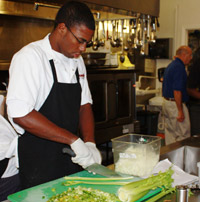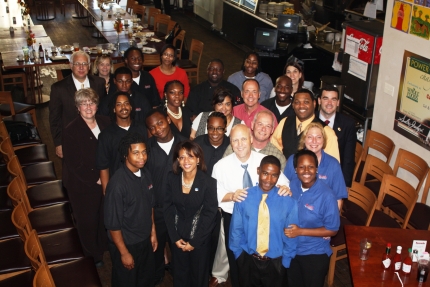Innovation with Crawfish Sauce: What a New Orleans Nonprofit Can Teach the Rest of the Country
Earlier this month, I joined the President in New Orleans for his first visit there since the election. A key part of the President’s message was that the Gulf Coast’s recovery didn’t flow just from government programs and policies:
I've talked a lot today about what steps we've taken at the federal level to help the Gulf Coast recover and rebuild. But the true story is this community's unbending resilience. That doesn't start in Washington. It starts right here, in the reborn neighborhoods of New Orleans. . . . The story of this city's resilience begins with all the men and women who refused to give up on their homes; who stayed to clean up and rebuild -- not just their own homes or their own yards or their own lives, but their neighbors', too.
I wanted to witness this bottom-up strength firsthand, so after the president’s speech, I visited Café Reconcile, one of the many innovative community organizations that have stepped up to help the Gulf Coast recover following Katrina.
Located in the distressed Central City neighborhood of New Orleans, Café Reconcile (www.cafereconcile.org) helps at-risk young people aged 16-22 with life skills, while training them for jobs in the restaurant business, one of the largest employers in New Orleans. Reconcile’s students are poor, many are high school dropouts, come from broken homes, are victims of abuse, or are veterans of the juvenile justice system. Café Reconcile provides case management, academic training, and on-the-job experience at a working restaurant that is popular for its staples like baked chicken, fried catfish (with or without crawfish sauce), and jambalaya.
On Thursday I sat down with staff and participants to enjoy a late lunch. We were joined by Louisiana Lieutenant Governor Mitch Landrieu and Tulane University President Scott Cowen.
“There are no bad kids on the streets of New Orleans,” Reconcile’s Director of Programs, Donna Bowie told us. “They may not have had the nurturing and support that you and I had, but that's what we provide at Café Reconcile."
One by one, the young program participants and alumni shared their stories, stories of heartbreaking challenges like teenage pregnancies and run ins with the law, but also stories of redemption, of the difference it makes to have caring adults, supportive peers and a job to do.

Christopher Lewis came to Reconcile after being kicked out of school for fights and combating a drug habit. He told us that Reconcile gave him a sense of responsibility, “I realized that the world keeps moving and I can't just stay put. My mom can't do it for me, my family can't do it for me, I have to do it for myself."
Sometimes it is the small things that make all the difference. Michael Smith, a 20-year-old participant in the program, told me about the self-confidence he gained just by wearing a professional uniform. He started to tear up as he talked about his nine younger siblings, who had been through so much, being proud of him as he left home dressed for work. Smith experienced family drug use, witnessed neighborhood violence and has been forced to move six times since returning to the city following Hurricane Katrina. He came to Reconcile after dropping out of school as a junior and struggling to maintain employment.
Nearing the end of Reconcile’s program, his peers hail him as a natural leader in the restaurant. Most importantly, Michael has set an example for his siblings and his community.

“Reconcile taught me the skills to get a job and keep a job,” said Doris Sylvan, a 19-year-old single mother who graduated from Reconcile’s program and now works there mentoring other students while attending community college. “There need to be more programs like this.”
Well, here at the White House, we agree with Doris. There need to be more programs like Café Reconcile, not just in New Orleans, but across the country. All across the nation, people are finding solutions to society’s most intractable problems, like the dropout rate, childhood obesity, persistent poverty, or homelessness. These innovators are breaking through bureaucratic barriers and reaching people in need in ways that no government program could. We think that these hidden gems should be identified and their solutions replicated in more communities, but that’s easier said than done.
Let’s take the case of Café Reconcile. The nonprofit is planning a big expansion that will include a catering business, a family learning center, and business accelerator. In order to achieve that growth, the organization needs a few things. It needs additional staff, new equipment and renovated space – or what we call “overhead costs” to expand its operations.
These resources are often the hardest funds to raise from foundations and private donors. Reconcile needs to be able to prove to potential funders that it is having an impact by showing, for instance, that their students go on to get their GEDs and keep jobs. Proving that impact takes expertise and resources that are also hard to come by for small community groups. Finally, Reconcile needs technical expertise to help them continually improve their model and help more kids.
We think that the government has an important but limited role in helping groups like Café Reconcile take the next step.
That’s why the President has established a Social Innovation Fund. Run out of the Corporation for National and Community Service, the Social Innovation Fund will provide the growth capital that is largely lacking in the philanthropic sector.
This fund will invest in programs we know are high-impact and help them grow to other communities around the country. This is a new role for government. Instead of simply funding services year after year, the President believes government can play a more dynamic role by seeking out creative, results-oriented programs and serving as a catalyst for replicating those efforts. That’s also why we are looking at other ways to promote capacity building among nonprofits, all the while having a dogged focus on impact and metrics. We have to know that we are getting a good return on the investment of taxpayer dollars.
This isn’t an idea that started with President Obama. Scott Cowen and Mitch Landrieu have been on the front lines for years. At Tulane, Cowen is working to train the next generation of innovators who are changing the way we solve problems. Tulane was selected by Ashoka, the world's leading network of social entrepreneurs, as a Changemaker Campus. Landrieu created the nation’s first statewide Office of Social Entrepreneurship, which is looking to help promising nonprofits identify and leverage available resources.
Lieutenant Governor Landrieu in his closing statements at Café Reconcile explained why Louisiana has become a hotbed of social entrepreneurship and why it matters for the rest of the country. “In the aftermath of Katrina, we are teaching the rest of the country how to deal with the problems of living in a great city. We didn’t ask for this responsibility, but the truth is that the answers to America’s problems are coming from the streets of New Orleans.”
That is true for innovative nonprofits all across the country. The solutions to our great challenges may be being invented on the streets of Portland, Denver, Miami, or everywhere in between. Only New Orleans may be the only place where those solutions also come with Shrimp Ettoufee.
Melody Barnes is Director of the White House Domestic Policy Council
White House Blogs
- The White House Blog
- Middle Class Task Force
- Council of Economic Advisers
- Council on Environmental Quality
- Council on Women and Girls
- Office of Intergovernmental Affairs
- Office of Management and Budget
- Office of Public Engagement
- Office of Science & Tech Policy
- Office of Urban Affairs
- Open Government
- Faith and Neighborhood Partnerships
- Social Innovation and Civic Participation
- US Trade Representative
- Office National Drug Control Policy
categories
- AIDS Policy
- Alaska
- Blueprint for an America Built to Last
- Budget
- Civil Rights
- Defense
- Disabilities
- Economy
- Education
- Energy and Environment
- Equal Pay
- Ethics
- Faith Based
- Fiscal Responsibility
- Foreign Policy
- Grab Bag
- Health Care
- Homeland Security
- Immigration
- Innovation Fellows
- Inside the White House
- Middle Class Security
- Open Government
- Poverty
- Rural
- Seniors and Social Security
- Service
- Social Innovation
- State of the Union
- Taxes
- Technology
- Urban Policy
- Veterans
- Violence Prevention
- White House Internships
- Women
- Working Families
- Additional Issues


